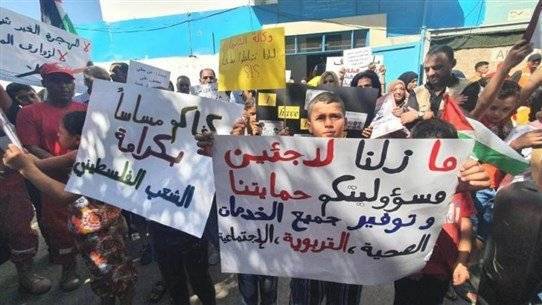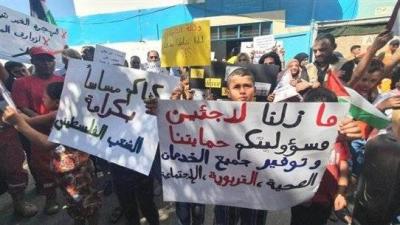The recent tragedy of a drowning boat near the coast of Tartus in Syria, carrying Lebanese, Syrians, and Palestinian refugees, has once again highlighted the dire conditions of the camps in Lebanon. The residents are living in misery and despair, which has led entire families to risk the dangerous sea journey in search of relief from their unbearable suffering. The rate of extreme poverty in the camps has doubled due to the worsening Lebanese economic crisis and its prolonged duration. Palestinians remain deprived of their civil, social, and human rights, while the UNRWA struggles with financial deficits and is failing to fulfill its responsibilities in providing services and livelihoods until their return.
Estimates from the "Palestinian Popular Committees" indicate that the percentage of extreme poverty has escalated to 60%. The job market is closed, unemployment has spread, and all segments of society are affected. Those who do manage to find work earn no more than $50 a month, which is insufficient to meet basic needs, especially amid the collapse of the Lebanese currency and the rising dollar exchange rate. This situation has led to increased frustration among youth and families, forcing them to board death boats in search of a better life.
Palestinian social activist Ibtisam Abu Salem, from the Ain al-Hilweh camp, stated to "Nidaa Al-Watan" that it is high time for the UNRWA to take responsibility for the refugees, to work towards establishing a social, economic, health, and educational safety net, and to seriously seek funding while putting in place a sustainable emergency plan to accompany the crisis until refugees can return to their homes and properties according to Resolution 194. Efforts are needed to secure job opportunities since the agency is responsible for relief and care, including employment.
"We are still refugees, and it is your duty to protect us and provide all health, educational, and social services," highlighted a banner raised by hundreds from Ain al-Hilweh during a protest organized by the "Coordination Framework of Palestinian Institutions" outside the UNRWA director's office in the camp. They demanded alleviating the refugees' suffering before a potential social explosion.
Among the protesters stood the young girl Aiya Khattib, holding a sign that read "We are tired." With a trembling voice, she expressed, "We are exhausted from poverty, hunger, and illness. We live amidst suffocating crises, we can no longer bear the poverty that confines us, and the rising costs are nearly overwhelming us. Our ability to endure is gradually fading, but we will not give up, and our eyes will remain fixed on Palestine because the occupation is the cause of all calamities."
Henadi Salameh did not hide her tears when she witnessed the humanitarian tragedy on the drowning boat, stating, "I cried... yes, and I couldn't control myself. We do not want to die at sea or be eaten by fish. The UNRWA must provide a dignified life and recognize the growing public anger before it's too late, launching a comprehensive health and relief emergency plan."
Activist Hamza Tohibish urged UNRWA to fulfill its responsibilities and increase the number of beneficiaries from the social affairs program, especially for cases of severe hardship. He called for a comprehensive health plan to free refugees from exploitative health markets and their financial and administrative fluctuations, as well as a solid educational strategy for the school year to address current issues and ensure a better educational future.
Alongside civil society protests, the Independent Unified Palestinian Movement organized a peaceful demonstration outside the UNRWA vehicle parking lot in Sidon as part of ongoing protest actions called for by the agency to carry out its duties in light of the gripping crisis in the camps. Activist Jihad Maoud criticized UNRWA for neglecting its responsibilities and services, which should be provided exceptionally given the current situation in Lebanon, stating that providing monthly financial assistance and comprehensive healthcare is the least that can be done for Palestinian refugees.




